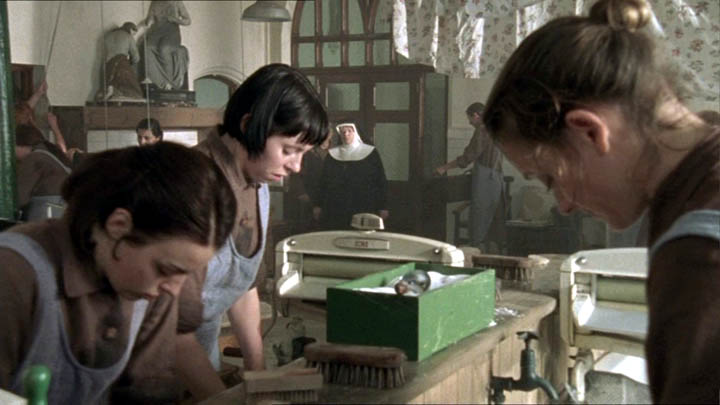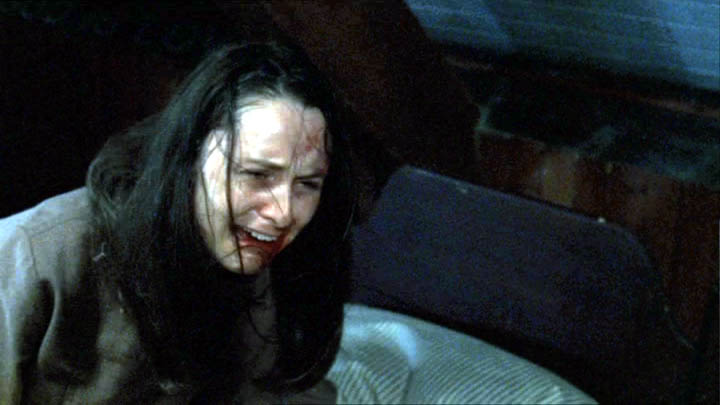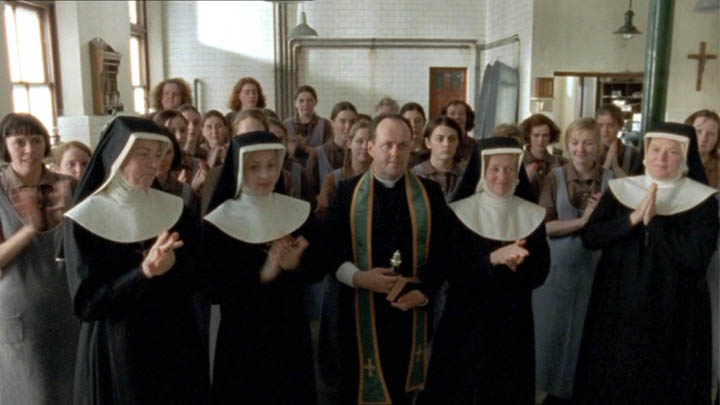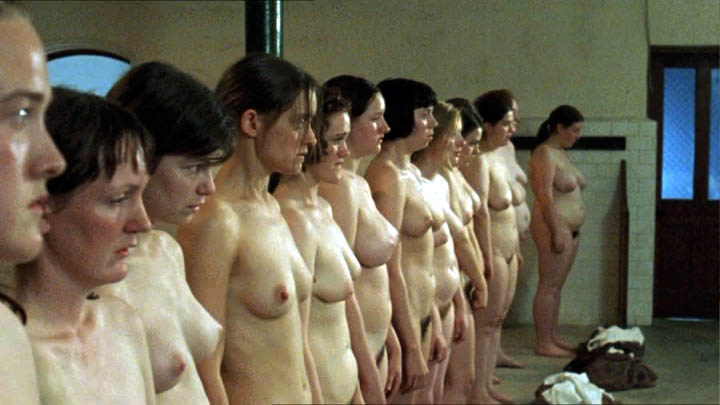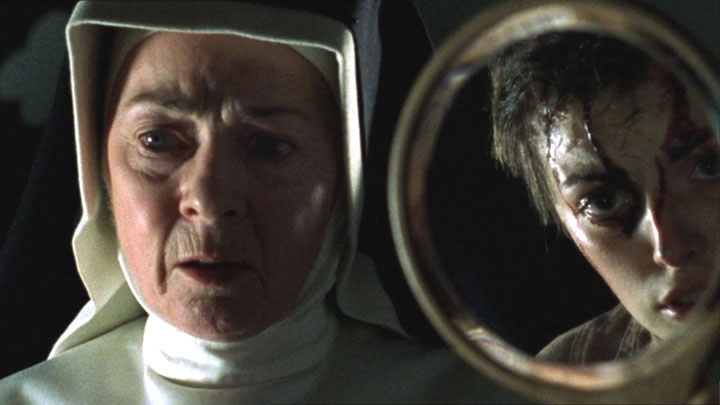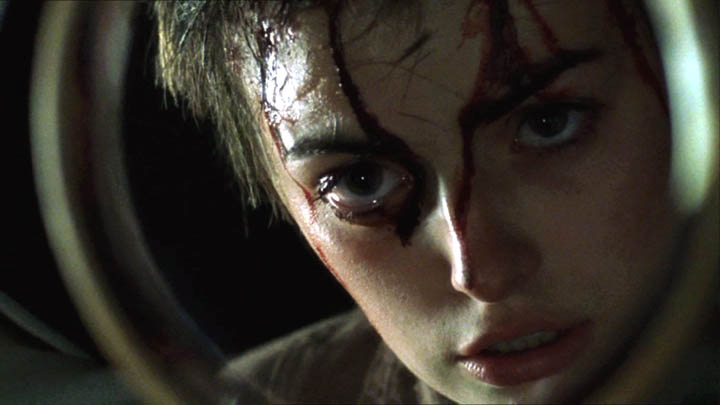|
Back to First Page
This review and the pictures that accompany it may be
Most of us, myself included, believe that we are sophisticated adults who have lived a bit and know what the world is like and aren’t going to be easily shocked by anything that we might come across in a film. Well, I have to admit that I was genuinely and deeply shocked, to the point of emotional numbness, by the film The Magdalene Sisters..
It’s set in Ireland in the 1960s and tells the story of the laundries run by the Sisters of Mercy and others exploiting the labour of young girls who were handed over by their parents for real or imagined offences against the Roman Catholic concept of sexual purity. A flirtation with a teenage boy, or just being suspected of harbouring an inappropriate attitude might be enough, or the “crime” of being a rape-victim. In most cases though it was a teenage pregnancy that sealed a girl’s fate. They were held prisoner in locked institutions where they were beaten, terrorised, humiliated and starved by sadistic nuns and sexually exploited by maverick priests. For most of the inmates there was no prospect of release this side of the grave.
The film is meticulously researched and even the Catholic Church and the Sisters of Mercy order itself have been unable to challenge its authenticity. In fact, there are reports that, according to some survivors, the abuses depicted in The Magdalene Sisters actually fall short of the worst that really happened, and the Director has commented that he refrained from recreating the most terrible reported incidents for fear of overwhelming and alienating his audience. What he has chosen to show is heart-stopping in its graphic horror, and portrayed with consummate skill and total conviction by a truly outstanding group of actors and actresses in which I could find not a single weak link.
I should stress that we aren’t talking about the Dark Ages here. While these things were going on I was an adolescent boy attending a school run by the Irish Christian Brothers, listening to Bob Dylan and the Beatles, building little radio sets, writing stories for the school magazine, watching America reel under the Cuban missile crisis and the assassination of President Kennedy and then cheering the moon landing that rounded off the decade. Of course the Christian Brothers used the cane and the leather strap and beat us whenever the opportunity presented itself, for offences ranging from dumb insolence to failing to remember the multiplication tables. We accepted it because we believed that that was how things were supposed to be, that was what the educational process entailed. It didn’t occur to any of us until years later that there might be an ethical issue surrounding the casual beating of schoolchildren by middle-aged men in black frocks. I have known for a long time that Ireland was in many respects a primitive society back then, but seeing The Magdalene Sisters is comparable to discovering that it also had torture rooms and gas chambers in every convent annexe.
The film depicts the brutality of the laundries with a documentary distance that makes its message all the more powerful. We are shown girls being beaten and their hair hacked off in bloody chunks, reduced to tears by sadistic mockery, paraded naked and humiliated in front of their peers, forbidden to talk to one another, refused food and water and medical attention, their illegitimate babies dragged from their arms at birth and all contact with their families refused. No attempt is made to understand the mental processes of the people inflicting the cruelty, the Director having admitted that he found their behaviour and motivation incomprehensible.
Yet it does belong to a mind-set that will be familiar to anyone who has been raised in Roman Catholic institutions, even now, as I have confirmed in conversation with a young Roman Catholic friend. The rationale for the cruelty is very simple if you accept a few “spiritual facts”. If it is the case that the good go to heaven where they experience everlasting happiness and the bad go to hell where they experience everlasting suffering (and this scenario is accepted without question by traditional Irish Catholics), then any degree of misery suffered in this life pales into insignificance measured against the infinity of everlasting salvation or everlasting damnation. If suffering can bring souls to God then suffering is a good thing. Period.
I find this illuminating when I come to consider the motivation of believers in different (though similar) “spiritual facts”, the Islamic extremists who happily blow themselves and any unfortunate bystanders to kingdom come while announcing that “God is great”. Beliefs have consequences, they determine our actions. If I genuinely thought that it was the gateway to an eternity of happiness in another world then I would blow myself up too. Why not? What is the counter argument? To quote Thomas Henry Huxley “There are none that fill me with more terror than those who do not doubt”.
Approximately 30,000 girls were processed through institutions similar to the one depicted in The Magdalene Sisters between their first creation in the middle of the 19th Century and the closure of the last Magdalene laundry in 1996(!).
On May 11, 1999 the Irish Taoiseach (Prime Minister) Bertie Ahern issued the first official State apology for the crimes committed against the girls of the Magdalene Laundries: “On behalf of the State and of all citizens of the State, the Government wishes to make a sincere and long overdue apology to the victims of childhood abuse for our collective failure to intervene, to detect their pain, to come to their rescue.”
Long overdue indeed. To this day the Irish Catholic church has not officially issued a statement of apology. Only individual clerics and representatives of specific religious orders have spoken out. In making their film, Peter Mullan and the crew and actors involved have become the conscience of the whole Irish nation and the worldwide Roman Catholic Church. Perhaps if there is indeed a God he will bless them for that.
|
|
| |
|
| |
| |
| |
|
|
TO READ OR SIGN THE GUEST BOOK JUST CLICK ON THE |
